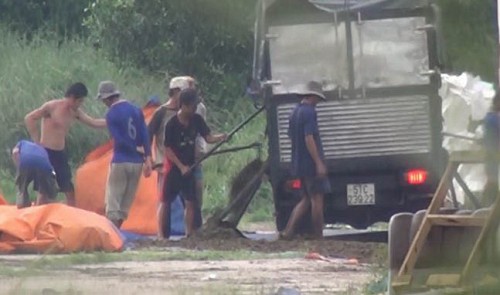Dirty tea sourced from Binh Duong, sold in HCMC

After discovering the awful technology of making tea from ‘buffalo dung,’ a term insiders use to call the reddish waste tea leaves that are leftovers of the tea-making process, Tuoi Tre undercover reporters continued to trace the whole path on which tea wastes are turned into processed tea.
Where are the tea wastes from?
Hung, a Binh Duong-based trader in charge of sourcing and supplying tea wastes for the Lam Dong crooked tea-makers, said two men named Trung and The are the only tea byproducts suppliers in the entire southern Vietnam.
Hung said he has been buying tea wastes from Trung at VND10,000 kg to resell to the Central Highlands tea-makers for nearly a year.
“As new customers, you have to pay VND12,000 per kg, and remember that these two men do not do business with strangers,” he told Tuoi Tre.
At Trung’s facility, a 6,000-square-meter land plot without a banner in Binh Duc Town, piles of tea residues are scattered on the ground, while some 20 employees are busy working with the drying machines.
At around 8 a.m. on July 25, a truck rushed into the venue, and was surrounded by eight employees who hurriedly used rakes to pull down the byproducts right to the ground. The tea wastes were still wet and smelled sour.
At 3 p.m. the truck got out of the facility to get a new batch of waste from what Tuoi Tre later discovered was a tea processing plant of Tan Hiep Phat Co, the manufacturer of popular bottled tea products like Tra Xanh Khong Do.
The workers revealed that their boss buys the byproducts directly from the plant at only VND1,000 a kg, or one tenth of the price he charges traders like Hung.
Sell in provinces
While people like Hung, Trung, and The are the southern ‘representatives’, a woman named Linh is one of the important parts of the chain in Lam Dong.
Linh sources the tea wastes from the facility of Trung, dries and grinds them into powder to sell to the dishonest tea-makers, who use them to mix with the authentic tea leaves to produce the scam products.
One of her big customers is Vu, who sells the products made from such dirty ingredients to traders in Ho Chi Minh City and the Mekong Delta provinces.
In response to Tuoi Tre’s discovery of the scam tea-making ring in Bao Loc City, Nguyen Van Quy, head of the economics bureau of the city’s People’s Committee, announced on Monday that the city would form an inspectorate team to probe the issue.
“We’ll look into the facilities as reported by Tuoi Tre, and the violators will be blacklisted and announced to members of the public,” he promised.
What the stars mean:
★ Poor ★ ★ Promising ★★★ Good ★★★★ Very good ★★★★★ Exceptional
Latest News
More News
- Congratulations from VFF Central Committee's int’l partners to 14th National Party Congress (January 25, 2026 | 09:46)
- List of newly-elected members of 14th Political Bureau announced (January 23, 2026 | 16:27)
- 14th Party Central Committee unanimously elects To Lam as General Secretary (January 23, 2026 | 16:22)
- List of members of 14th Party Central Committee announced (January 23, 2026 | 09:12)
- Highlights of fourth working day of 14th National Party Congress (January 23, 2026 | 09:06)
- Press provides timely, accurate coverage of 14th National Party Congress (January 22, 2026 | 09:49)
- Press release on second working day of 14th National Party Congress (January 22, 2026 | 09:19)
- Minister sets out key directions to promote intrinsic strength of Vietnamese culture (January 22, 2026 | 09:16)
- 14th National Party Congress: Renewed momentum for OVs to contribute to homeland (January 21, 2026 | 09:49)
- Party Congress building momentum for a new era of national growth (January 20, 2026 | 15:00)
















 Mobile Version
Mobile Version